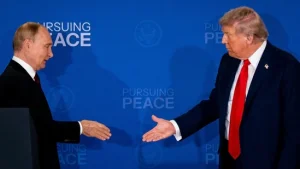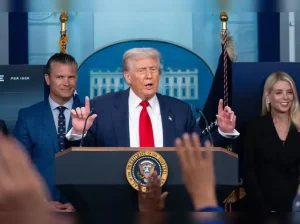New Delhi – The announcement that India US Trade Talks Postponed from their scheduled August 25 date has sent shockwaves through bilateral trade communities as the United States prepares to implement devastating additional tariffs. The postponement comes at a critical juncture when both nations face mounting pressure to resolve escalating trade tensions before the August 27 deadline for new penalty implementation.
The decision regarding India US Trade Talks Postponed represents a significant setback for diplomatic efforts aimed at preventing what could become one of the most damaging trade disputes between these strategic partners. Sources indicate that despite intensive behind-the-scenes negotiations, fundamental disagreements persist regarding tariff structures and broader economic cooperation frameworks.
Imminent Tariff Implementation and Economic Impact

With India US Trade Talks Postponed, the United States appears determined to proceed with implementing an additional 25% tariff on Indian goods starting August 27. This dramatic escalation would effectively double total US duties on Indian exports to 50%, creating unprecedented challenges for key economic sectors and export-dependent businesses.
The tariff implementation, proceeding despite India US Trade Talks Postponed, stems from an executive order connected to broader geopolitical developments, particularly the ongoing impasse in peace negotiations involving the US, Russia, and Ukraine. Washington’s unwillingness to modify its stance reflects complex international considerations extending beyond bilateral trade concerns.
Key sectors facing severe impact from these penalties include textiles, pharmaceuticals, and engineered goods, which form the backbone of India’s export economy. The India US Trade Talks Postponed situation has created anxiety within India’s export community, as businesses struggle to prepare for potential market disruptions and cost increases.
Alaska Summit Outcomes and Limited Progress


Recent diplomatic engagement at the Alaska summit failed to produce breakthrough results that might have prevented India US Trade Talks Postponed or modified the tariff timeline. Despite high-level discussions between senior officials, no substantive agreement emerged regarding trade penalty modifications or structural cooperation improvements.
However, post-summit statements suggest some flexibility in Washington’s approach to secondary sanctions, though this limited progress has not extended to the primary 25% tariff issue. The India US Trade Talks Postponed decision indicates that whatever diplomatic gains occurred at Alaska were insufficient to address fundamental trade disagreements.
The summit’s limited success in preventing India US Trade Talks Postponed highlights the complexity of current geopolitical dynamics, where trade relationships become entangled with broader strategic considerations involving multiple international actors and competing national interests.
Ongoing Negotiation Efforts and Diplomatic Channels


Despite India US Trade Talks Postponed, intensive negotiations continue between Indian and US officials seeking potential reprieve from additional duties. These behind-the-scenes discussions represent last-ditch efforts to identify compromise solutions that could prevent the most damaging aspects of the impending tariff implementation.
Negotiators from both sides are exploring whether the 25% penalty can be suspended or reconsidered, even though India US Trade Talks Postponed suggests fundamental disagreements remain unresolved. The urgency of these discussions has intensified as the August 27 deadline approaches, creating pressure for rapid decision-making.
The situation surrounding India US Trade Talks Postponed remains fluid, with trade officials expected to maintain intensive engagement over coming days. These efforts focus on identifying temporary understanding mechanisms that could provide breathing room for more comprehensive long-term solutions.
Bilateral Trade Agreement Prospects and Long-term Strategy
Beyond immediate tariff concerns, the India US Trade Talks Postponed situation affects broader discussions around a comprehensive Bilateral Trade Agreement (BTA). This long-term framework aims to address structural trade imbalances while creating more stable economic partnerships between these major economies.
Also Read: Big Statement By Marco Rubio On India Pakistan Situation, Reveals Daily US Monitoring
The BTA discussions continue despite India US Trade Talks Postponed, reflecting both nations’ recognition that current trade tensions require systematic resolution rather than ad-hoc measures. These broader negotiations encompass complex issues including market access, regulatory harmonization, and strategic economic cooperation.
Progress on the BTA could potentially provide context for resolving immediate issues that led to India US Trade Talks Postponed, though timeline pressures make comprehensive agreement unlikely before the August 27 tariff implementation date.
Geopolitical Context and Ukraine Connection
The India US Trade Talks Postponed situation cannot be separated from broader geopolitical developments, particularly the ongoing conflict involving Russia and Ukraine. Washington’s trade stance reflects complex strategic calculations that extend beyond bilateral economic considerations with India.
President Trump’s post-Alaska summit comments indicated remaining sticking points in discussions with Russian leadership, while emphasizing Ukraine’s role in conflict resolution. These broader geopolitical dynamics directly influence US willingness to modify trade positions, contributing to India US Trade Talks Postponed.
The absence of peace agreements in other international contexts has strengthened Washington’s reluctance to modify its trade penalty positions, making resolution of India US Trade Talks Postponed more challenging within current geopolitical frameworks.
Strategic Implications and Future Outlook

The India US Trade Talks Postponed development raises fundamental questions about the future of one of the world’s most strategically significant trade relationships. Both nations face pressure to balance immediate economic interests with longer-term strategic partnership requirements.
As the August 27 deadline approaches, the consequences of India US Trade Talks Postponed will likely extend beyond immediate trade impacts to influence broader bilateral cooperation in defense, technology, and regional security matters. The outcome of current negotiations could establish precedents for managing future trade disputes between major democratic economies facing complex geopolitical pressures.

